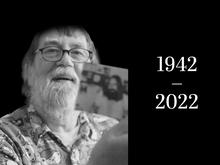Alfred remembered everything. What book you read, what holiday you came from, how you found the concert five years ago, what the thesis from 20 years ago was about, which highway led where and which prison is where in Germany. Alfred’s lexical memory would certainly have been of great help to the investigators.
But this huge man with long hair and a full beard just didn’t want to talk. Instead, he found a spot on the wall, focused on it, and said nothing. Now and then he would slap his hands on his thighs and exclaim, “That’s great!” In the end, the evidence was only enough to charge him with passport forgery. 22 months he was in jail. It was never revealed who it was who pulled the trigger during the shootout with the police in Wiesenbach on the night of June 24, 1971. Alfred told his friends that it wasn’t him.
Provoking the bourgeois, that was so easy
It was the time of the great uprising, and Alfred, whom everyone just called Shorty, was right in the middle of it. He had just been looking after his little sister, reading comics and listening to music in his room, carrying stuffed animals from school to school as an apprentice salesman for a teaching aids company. Now he sat on the steps of the Memorial Church and rolled joints. Listen to rock music, stop working: Shorty was one of the first bums in Berlin. Provoking the bourgeois, that was so easy, you just had to let your hair grow long. Alfred measured 52 centimeters in a hair length competition in Hasenheide, third place.
As a bum, you were bullied by the police, beaten up by Hertha fans, not served in restaurants, the Bild newspaper scandalized, passers-by shouted that they should be gassed. The bums, on the other hand, wondered how to get cheap hashish and which supermarket to clear out at night. When the “Rolling Stones” played in the Waldbühne in 1965, the tickets cost 10 marks, they quickly broke through the barriers and quickly stood in front of the stage. The Stones only played 20 minutes, the police arrested a few of them and the riot broke out.
Alfred and his bums, members of Commune 1 and other communities formed the “Central Committee of the Wandering Hash Rebels”. They met for high-profile “smoke ins” in the Tiergarten, wrote articles for the anarchist magazine “883”, set police cars on fire in revenge because the dope was confiscated from them or because Benno Ohnesorg had been shot.
The only one who reached for the dishcloth
While for many the revolution was a serious, intellectual affair, Shorty took it more on the funny side. He was not the least bit interested in Hegel, nor in the trench warfare of individual political splinter groups. He tried drugs for this, and also injected himself with heroin. In the one apartment where Shorty and his crew always turned up, first smoked weed and then ate the fridge, the girls complained that the men never washed the plates. There was a lot of screaming. The only one who reached for the dishcloth was Shorty. Anyway.
But of course he was also concerned with politics, with justice in general. His friends say he was against the strict drug policy. And he knew everyone: Rudi Dutschke, Fritz Teufel, Uschi Obermayer, Bommi Baumann. One thing led to another, and Shorty was there.
But when it came to robbing banks and setting firebombs, he was left out. “You have a hard time at one ninety-seven. You can’t go to a bank there. You’re always on the radar at five foot nine,” he said in a documentary. But Shorty was not only big, but also slow and rather good-natured. like a bear Not very suitable for campaigns, it was enough for logistics trips by car. After one such he was arrested. A photo shows him, long hair, a full beard, his arms behind his back, towering far above the police officers.
After prison, Shorty renovated apartments and looked after friends’ children. He had that special calm that kids liked. At some point he was hired as a bouncer in the “Loft” on Nollendorfplatz, then he became a night watchman in the “Wintergarten”. In the evenings he opened, watched the bands, made his jokes with the musicians backstage, gradually everyone went home until only he was there doing his rounds. In the stillness of the night he could read until the new day broke. Even when he wasn’t working, he stayed up until dawn, smoking his Roth-Handels and watching TV, because: “The good old films come at night”.
When Shorty called, your ear would glow after the call. If you met in the pub, it got late because Shorty still had a story to tell. With his need to talk, he could really annoy. At the same time there was something about him, a kindness, the way he sought out closeness, took care of cats and dogs, how he wore those shirts with the shrill, colorful motifs, how happy he was when he had a good coat and good shoes as a gift, how he reliably called for his birthday.
When he got sick, his friends were there. Polyneuropathy, an incurable, painful nerve disease. But Shorty didn’t want to give up his life. First with crutches, then with the walker, which he hated, he fought his way to the pub or to the party. “You just cling to your miserable existence.” A box was passed around at his funeral containing small hand-rolled joints.
To home page

